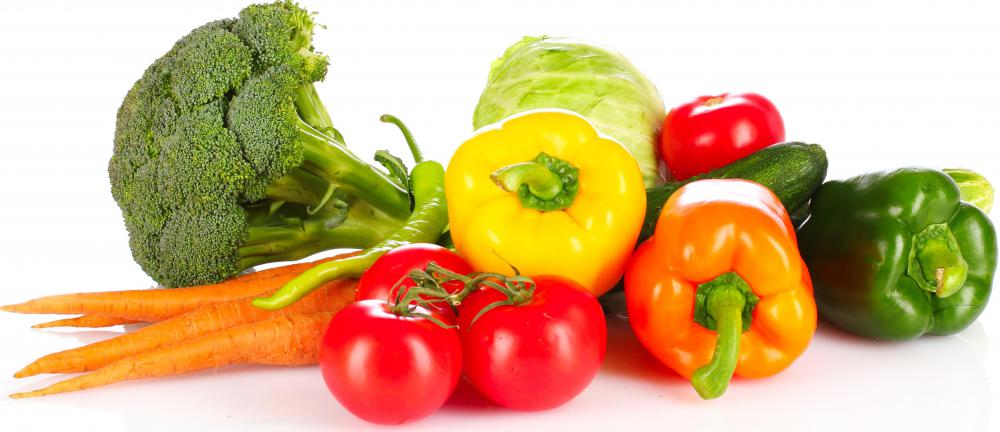At TheHealthBoard, we're committed to delivering accurate, trustworthy information. Our expert-authored content is rigorously fact-checked and sourced from credible authorities. Discover how we uphold the highest standards in providing you with reliable knowledge.
What are the Health Benefits of Vegetables?
People are often told to eat their vegetables, and there's a good reason for this: there are numerous health benefits of vegetables which make them a very important part of the human diet. Eating between four and eight one cup servings a day confers a number of benefits which cannot be obtained from other food sources.
Vegetables contain a number of vitamins and minerals which are beneficial to the human diet. Things like potassium, vitamin C, folate, and vitamin A, among many others, can be found in abundance in vegetables. These vitamins and minerals are needed by the body on a daily basis, and they also help the body stay healthy so that it can prevent or cope with disease and injury. Pregnant women and people with certain chronic diseases also appear to benefit from an increased intake of dietary minerals and vitamins.

Other health benefits of vegetables can be found in the phytonutrients which they contain. These nutrients do not appear to be immediately necessary to the human diet, but they seem to confer some benefits such as protection against cardiovascular disease. Diabetes, some cancers, kidney disease, stroke, and bone loss appear to be at least partially preventable with a high intake of vegetables, as evidenced in numerous dietary studies.

Studies have also suggested that eating whole foods appears to be more beneficial than consuming supplements. The health benefits of vegetables cannot be replaced, in other words, by eating vitamins, because vegetables have complex trace compounds which cannot be copied, and because the vegetables themselves appear to help the body metabolize useful vitamins and minerals.

Vegetables are also high in fiber, which can reduce the risk of developing cardiovascular disease and some cancers while regulating digestion. Fiber can also be found in whole fruit. Fruit and vegetable juices lack fiber, although they contain many of the vitamins and minerals found in whole fruit. The health benefits of vegetables can be obtained from raw or cooked vegetables, with frozen vegetables being a good option when fresh vegetables are not available.

Something to keep in mind when thinking about the health benefits of vegetables is that it is a good idea to eat a rainbow of colors. Vegetables of different colors have varying levels of vitamins and minerals, and by eating a range of colors, people can ensure that they get the full arrray of nutrients they need. Carrots, for example, are high in vitamin A, while dark leafy greens have lots of calcium. Carrots or broccoli alone will not provide complete nutrition.
AS FEATURED ON:
AS FEATURED ON:
















Discussion Comments
Eating raw vegetables is really good for you, as they have more nutrients and also more vitamins in them.
ColdRain- Eating vegetables is good for you, no matter if they are cooked or raw. However, eating certain raw vegetables is often better than eating cooked vegetables. Raw vegetables are fresh and unprocessed and therefore have the maximum health benefits. Certain types of cooking methods can draw nutrients out of the vegetables and leave them in the water or the oil that they are being cooked in.
If you are eating raw vegetables, you will want to make sure that you fully clean them. Run them under cool water for at least a couple of seconds to remove any pesticides or dirt.
Are there more benefits of eating raw vegetables as opposed to eating cooked vegetables?
Post your comments